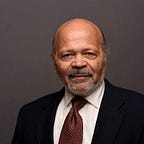IT’S NOT PARANOIA
One summer night in 1963, I walked through New York City’s Morningside Park, on my way to hear the noted author, James Baldwin, speak at Columbia University.
I had come up from Virginia to attend summer school at New York University in Greenwich Village. Not being a native New Yorker, I was taken aback when I realized that Columbia, a “white university,” sat comfortably in the middle of Harlem.
The transformation that took place in the short distance from the subway station at 116th Street and Eighth Avenue, to the eastern gateway to Columbia’s central campus caused me to experience what can only be described as a sense of political imbalance. This island of affluence amid a gulf of oppression and deprivation spoke to the importance of political will. I felt that surely some of the money used to beautify Columbia’s campus could be used to improve the lives of Black people living just a few blocks away — if there was the political will to do so.
I cannot recall the building where Baldwin spoke, or exactly what he said. But I do recall that a large portion of the audience was white and well educated, and the main thrust of the author’s speech was to point out and condemn the race based inequities in America’s social structure.
After he spoke, Baldwin took questions from the audience. One white man, on the younger side of forty, asked the speaker if he wasn’t being just a bit paranoid. The questioner presented himself as “liberal” and sympathetic to the “condition of the Negro,” but the tone of his question marked him as a skeptic. I do not remember Baldwin’s exact words, but I do remember his response. — You are not paranoid if they are after you.
It is no accident that people of color are oppressed, deprived of opportunity and even preyed upon by a system that easily feeds upon us because of our political and economic weaknesses. From the institution of chattel slavery in the Seventeenth Century, to the looting of Black pockets through a system of judicial fines supporting towns like Ferguson, Missouri in the Twenty-First Century, people of color have been preyed upon in America. People of color are not paranoid in America, because the dominant culture is out to get us. And history has shown us that most decision makers at all levels of government in the U.S. lack the political will by to fix this.
Now, with a radical shift to the right, America has become even more hostile towards people of color.
The French satirical magazine “Charlie Hebdo” — famous for the 2014 slaughter of its staff members in Paris — recently ran a cover with a cartoon image of Barack Obama running for his life, while being shot at by white police officers. The caption, roughly translated into English reads, “Obama, just another citizen now.” But the implication is that as a Black man he now faces the threat that the average Black man faces daily.
The Charlie Hebdo cover is telling on several levels. It lets us know that people in other countries recognize the slaughter of unarmed Blacks in America for the racially motivated murder that it is. It also affirms the fact that the rest of the world realizes that personal accomplishments will not protect Black people from the reality that the color of our skin places a target on our backs.
Some local police departments are little more than “hunt clubs” geared towards “bagging” Black folk. Until recently, those “hunters” have had to be mindful of the United States Department of Justice. But with the impending change in the leadership of that agency, there is likely to be no recourse to the federal government for protection against this slaughter. The notorious racist, Jeffery Sessions, will soon be the Attorney General of our country heading up that agency, and under his racist leadership, we can only expect the worst.
It is not paranoia to believe that people of color need to organize to fend off the upcoming assaults on our rights and on our persons. It is not paranoia to create workshops and programs that will teach people of color how to protect their wallets from commercial and judicial predators. It is not paranoia to do all that we can to protect and defend ourselves from a nation that has proven time and time again, throughout its history, that it has no love for people of color. It is not paranoia, because they are after us.
